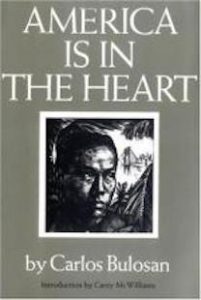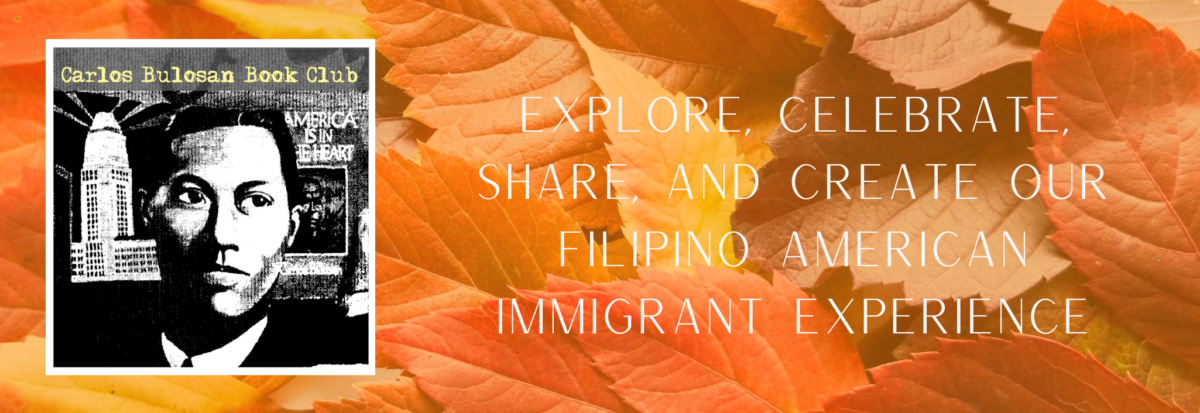A webinar class On “America Is In The Heart” was conducted in the summer of 2020. CBBC conducted this webinar class & developed a curriculum to help participants gain the most from Bulosan’s seminal work.
Watch this video “Introduction to Carlos Bulosan” by Professor Jeffrey Cabusao, CBBC Events Jan 20, 2024. WATCH NOW
Required READING
 “America Is In The Heart” by Carlos Bulosan (available in your local public library and on Amazon)
“America Is In The Heart” by Carlos Bulosan (available in your local public library and on Amazon)
Note: As you read the book, try following Allos’s travels with your device (eg desktop, laptop, notebook, phone, etc), using Google maps and/or Apple maps.
ADDITIONAL READINGS & VIDEOS
Filipinotown: Voices from Los Angeles (Chapters 9, 10,& 12) by Carlene Sobrino-Bonnivier
Chris Mensalvas: Daring to Dream by Gene Viernes
How Filipino Migrants Gave the Grape Strike Its Radical Politics by David Bacon
Little Manila: Filipinos in California’s Heartland (Stockton California)
Dollar a Day, 10 Cents a Dance by Mark Schwartz
How San Francisco Erased a Neighborhood (A story about the I-Hotel)
Delano Manongs by Marissa Aroy
The First Vietnam: the U.S – Philippine War of 1899 by Luzviminda Francisco (1973)
The Philippines Reader: A History of Colonialism, Neocolonialism, Dictatorship, and Resistance by Luzviminda Francisco (Author), Shirley Jenkins (Author), Luis Taruc (Author), Renato Constantino (Author), Ramon Diokno(Author)
The Forbidden Book: The Philippine-American War in Political Cartoons by Abe Ignacio et al.
Freedom from Want by Carlos Bulosan published in the Saturday Evening Post (SEP) in March 1943. Read the other Three Freedom Essays published by the SEP.
Course Overview
Carlos Bulosan was born in the Philippines in the rural farming village of Mangusmana, near the town of Binalonan (Pangasinan province, Luzon island). He was the son of a farmer and spent most of his upbringing in the countryside with his family. Like many families in the Philippines, Carlos’s family struggled to survive during times of economic hardship. Many families were impoverished and many more would suffer because of the conditions in the Philippines created by US colonization. Rural farming families like Carlos’ family experienced severe economic disparity due to the growing concentration of wealth and power in the hands of the economic and political elite. Determined to help support his family and further his education, Carlos decided to come to America with the dream to fulfill these goals.
- Session 1: July 2020 (Part 1: Chapters 1-12; Part 2: Chapters 13-25) – Watch Session 1 Recording
- Session 2: August 2020 (Part 3: Chapters 26-37; Part 4: Chapters 38-49) – Watch Session 2 Recording
Class Agenda (Sessions 1 & 2)
- Opening – Jaime Geaga, chair of CBBC
- Welcome & acknowledgments
- Review of agenda
- Quick poll
- Review ground rules for breakout groups (see below).
- Topic presentations:
- US-Philippines relations during the turn of the century by Carol Ojeda-Kimbrough
- Manongs and the labor movement in the early 1900’s by Carol Ojeda-Kimbrough (Long Road to Delano by Sam Kushner – Suggested Reading)
- Colonial Mentality by Florante Ibanez
- Popular culture and the “manongs” by Florante Ibanez
- Jaime Geaga – the “four freedoms” by FDR inspiring Norman Rockwell’s 4 related paintings and the accompanying essays, one of which was penned by Bulosan “Freedom from Want“. (Watch video here.)
- Breakout Group Session (50 minutes) – 8 breakout groups.
- Participants will be randomly assigned to a group with a facilitator (Carol Ojeda-Kimbrough, David Rockello, Florante Ibanez, James Castillo, Jaime Geaga, Joselyn Geaga-Rosenthal, Rose Ibanez, & Vicky Perez).
- Each participant give a brief intro including name, place of residence, brief background, and why you signed up for the webinar class. From your reading of the book, share either a character (besides Allos), an incident, or a location/setting that deeply affected you (3 minutes each).
- Each breakout group designate a volunteer to take notes of the group’s discussion
- The volunteer notetaker will then give a summary to the general group at the end.
- QUESTIONS FOR BREAKOUT GROUPS:
- The first part of the book describes the life of Bulosan from childhood until he leaves the Philippines for the US. What were the push/pull factors that led him and other Filipinos to leave their birth country to move to the US?
- What were/are the push/pull factors that led your family to immigrate to the US?
- Discuss the differences between Spanish vs American colonial rule (e.g., role of class (ilustrado v peasant), “race” and gender) and how did these factor in the Filipino diaspora?
- What is your understanding of “colonial mentality”?
- Is education still a tool of American imperialism, and how does it reinforce colonial mentality?
- Why did so many of Carlos’ group’s attempts at attaining social justice goals fall short?
- Why does everyone around Carlos want him to write? What do they want to accomplish? Why does Carlos want to write? What does he hope to accomplish?
- What is the first goal, aside from labor unions, that their Filipino group accomplishes?”
- Back to the general group and report back from each break out group
- Closing
Speakers
- Carol Ojeda-Kimbrough (video presentations on US-Philippine Relations & Labor Organizing)
- Florante Ibanez (video presentations on Colonial Mentality & Manongs in Arts & Culture)
Guidelines for Breakout Groups
Share the air- Be mindful that there are other participants in the breakout group and allow others to share after you’ve had a turn sharing. Try to limit your sharing to 5 minutes or less.
Speak from your own view using “I” statements. Avoid interpreting others’ views.
Address ideas, not the person.
It is important that this is a safe space not only to be heard but also understand that it is judgment free.
We ask everyone to honor the confidentiality of other participants.
*Asian/Pacific American Librarians Association (APALA) – Is a sponsor of this webinar class.
